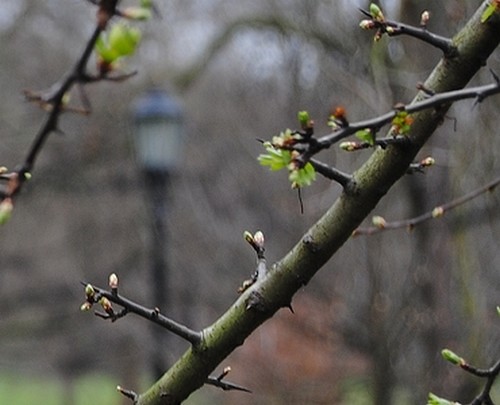
Some time ago we talked about the Zwölf Gedichte von Justinus Kerner, op. 35 (Twelve poems by Justinus Kerner), written between November and December 1840. Back then we said that Kerner, a doctor and also a poet, advocated the healing power of nature; that's the reason for nature’s outstanding role in these twelve poems selected by Schumman, an importance which was quite unusual during Romanticism. Erstes Grün is the fourth song of the cycle and the first one where nature is the main character; the poem is called Frühlingskur (Cure by Nature).
In just two stanzas we'll be attending to the end of winter and the beginning of spring. In the first stanza the poet invokes the first green, the fresh grass that could cure his heart sick with winter. Winter is related to depression and sadness, but just thinking of the climate, it's easy to understand the need of spring after so many months of darkness, cold and snow, by the way, we're talking about winter in Central Europe. In the second stanza anxiety becomes joy because the poet can see the first blades of grass, spring brings hope (along with light, colour and warmth). In the third stanza we know the reason for the poet's sorrow: winter is not the cause but people. That's why he's looking for solitude or, better said, loneliness along with nature, which is the only possible relief to his pain; we’ll find this idea several more times during this Schumann's cycle.
As mentioned before, for Kerner, Nature heals. But if we read carefully these verses , healing doesn't happen from mere contemplation, physical contact is needed: the poet removes some grass and brings it to his mouth and his heart, because just having that grass placed on his heart makes it beat more slowly. I don't want to take the poem's charm away, but I can’t help seeing teas and poultices, or, better, phytotherapy (which is a very old science). Or perhaps, if we go back to the poem's romanticism, the poet talks about grass as he would do about a lover: his heart misses her, his eyes laugh when they see her coming, he embraces her to his chest and his lips...
Schumann wrote a strophic lieder with this poem, thus giving it a folk air. The voice sings with melancholy from the beginning to the end, perhaps with a touch of anxiety, in contrast to the interlude. This interlude (also repeated at the end) is lively and optimistic, is perhaps the voice of spring? I think it's a beautiful song, the cycle is also one of my favourites. We are listening to Hermann Prey and Karl Engel; I hope you enjoy it and that if you are sick with winter (I'd rather complain about the heat), it will help you to patiently wait for spring to arrive.
Not that long ago we were longing for autumn to arrive in Barcelona!
Du junges Grün, du frisches Gras!
Wie manches Herz durch dich genas,
das von des Winters Schnee erkrankt
o wie mein Herz nach dir verlangt!
Schon wächst du aus der Erde Nacht,
wie dir mein Aug’ entgegen lacht!
Hier in des Waldes stillem Grund
drück ich dich, Grün, an Herz und Mund.
Wie treibt’s mich von den Menschen fort!
Mein Leid das hebt kein Menschenwort,
nur junges Grün, ans Herz gelegt
macht, dass mein Herze stiller schlägt.
Tu verd primerenc, tu herba fresca!
Quants cors han estat guarits per tu,
els que emmalaltiren per la neu de l’hivern,
oh, com el meu cor t’anhela!
Tot just rebrotes de la nit de la terra,
com somriu el meu esguard al teu encontre!
Aquí, en el fons tranquil del bosc,
jo et premo, oh verd, devers el meu cor i la boca.
Com em sento empès a allunyar-me de la gent!
El meu dolor no pot ser llevat per cap paraula humana,
només el verd primerenc arran del cor,
fa que em bategui més serenament.













